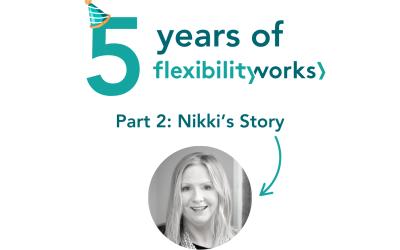Flexibility Works was co-founded by Lisa Gallagher and Nikki Slowey, and this story of our first five years is fittingly told in two parts.
Here, Lisa Gallagher looks back on our early days, our research and our work with hundreds of Scottish employers. In part two, Nikki Slowey shares her thoughts on our social purpose as well as what’s coming next for Flexibility Works.
 Nikki and I co-founded Flexibility Works five years ago. We’d each failed to find the flexibility we needed when our first children were born, and we’d both walked away from jobs we loved as a result. We realised we shared the same deep frustration with the rigid Monday-Friday 9-5 working week, and we shared the same passion to change it.
Nikki and I co-founded Flexibility Works five years ago. We’d each failed to find the flexibility we needed when our first children were born, and we’d both walked away from jobs we loved as a result. We realised we shared the same deep frustration with the rigid Monday-Friday 9-5 working week, and we shared the same passion to change it.
We saw opportunities for all kinds of people, not just mothers, to do brilliant work and manage home, family and health needs. And we saw opportunities for employers too – to retain talented workers, to reduce sickness and absence rates and to create happier, healthier and more invested teams that ultimately delivered better goods and services.
We’d already been working together in this field for several years, and put our existing knowledge and experience to good use in planning Flexibility Works to support employers to enhance their flexible working. Little did we know, a global pandemic was about to shake the world’s foundations and that flexible working would play such a significant role in helping organisations to survive!
As we reflect on our work and impact over the last five years, it’s heartening to see how our spark of an idea has transformed into a wider momentum for lasting workplace change because (we know you know!) flexible working really is good for people and for businesses.
In some ways, it feels like we’re only getting started. Flexible working is now much more of a household name but one in three Scottish workers still can’t work flexibly, and there are inequalities that aren’t yet budging – for example the less you earn, the less likely you are to work flexibly. There’s still so much to do.
Surviving the pandemic
 We opened for business in April 2020. Yep, we know that’s exactly when lockdown began but a global pandemic was very definitely not part of our launch plan! The advent of enforced home working reinforced the need for our services. But even we weren’t prepared for a business launch with no face-to-face interaction at all. I still remember the madness of trying to set up a new bank account when all physical branches were closed and services were in complete disarray. Ditto, the challenges of sourcing laptops and equipment for our small team of staff while simultaneously home-schooling and caring for our children – Nikki and I have six boys between us. It makes my eye twitch just thinking about it…
We opened for business in April 2020. Yep, we know that’s exactly when lockdown began but a global pandemic was very definitely not part of our launch plan! The advent of enforced home working reinforced the need for our services. But even we weren’t prepared for a business launch with no face-to-face interaction at all. I still remember the madness of trying to set up a new bank account when all physical branches were closed and services were in complete disarray. Ditto, the challenges of sourcing laptops and equipment for our small team of staff while simultaneously home-schooling and caring for our children – Nikki and I have six boys between us. It makes my eye twitch just thinking about it…
Our first resources focused on helping teams and managers transition to remote working, and our first clients also wanted support with home, and later hybrid, working arrangements. Over time, we’ve seen the trends in what our clients are looking for broaden, and we get just as many requests for support from frontline employers now too.
Flex today
Flexible working is now the norm in most workplaces with 67% of all workers working flexibly, up from 46% before the pandemic. Hybrid working, one form of flexible working, is stable too, with three quarters of office workers staying they can work from home some of the time.
In the last five years we’ve seen big legal changes that have made it easier for people to ask for flexibility, and the forthcoming Employment Rights Bill will make it harder for employers to unreasonably refuse flexibility too. We’re proud to have been part of the movement pushing for these positive changes, whether that’s by responding to government consultations, or taking part in working groups looking at how the Scottish Government in particular can influence employers and create policies that encourage greater flex. (Check out our flexible working law page if you’d like more info).
Research success
We’ve been conducting research on flexible working since our inception, and our Flex for Life research is Scotland’s most comprehensive analysis of flexible working. We strongly believe in making data-led decisions, and we know our robust insights are valuable to our clients and networks as they decide workplace policies. It also means we can instantly de-bunk some of the high-profile opinions that bubble up about flexible working too.
 Supporting hundreds of employers
Supporting hundreds of employers
We’re delighted to have directly supported more than 150 employers of all shapes, sizes, industries and locations to offer greater flexible working that suits the organisation and its people.
We’ve also welcomed more than 1,000 of you to our online and in-person events. We’ve covered all sorts of topics from what legal changes are pending to how to increase flexible working for frontline workers, and how to leverage flex for better recruitment.
Standout clients for us include the General Teaching Council Scotland, where we worked with the senior leadership team over the course of several months, and managed a staff listening exercise. Having built up a strong relationship with the team, we helped them shift to a more trusting and flexible culture where people could work hybrid, and mangers were confident in assessing performance and productivity.
We also worked with Edinburgh-based Seebyte, a software company specialising in maritime technology, to refine their approach to hybrid working. Their focus was on retaining skilled employees, and appealing to new and diverse talent in the software sector. We supported their leadership team to create a more cohesive approach to hybrid, taking into account the views of employees, and we also supported their managers to more confidently lead their teams in a flexible way.
More recently we loved working with commercial landlord Ceteris in Alloa, supporting some of their frontline teams to trial new ways of working including a compressed 4-day week for the maintenance team and new working patterns for the receptionists. This gives staff extra time to themselves and saves money on travel, and also benefits Ceteris because ‘inconvenient’ maintenance – eg. clearing a snowy car park, or drilling holes for new cables – can be scheduled early, or late, when most tenants aren’t in the office.
We have many more success stories like these, where our work blends sessions with senior leaders, staff surveys and feedback sessions, training for teams or managers, and clear, practical action plans our clients can take forward.

Strong team and network
Nikki and I know our successes are down to the brilliant team around us. Our staff team is as dedicated and passionate as we are to improving the world of work, and we’re always hugely grateful to our board members who give their time, professional insights and general all-round-hugely-reassuring-support.
And I will name check our current sponsors: Arnold Clark, SSE, Quorum and Pursuit Marketing, and our funding partner the Scottish Government. Thank you to all of you.
You can read Nikki Slowey’s thoughts on our social purpose and what’s coming next for Flexibility Works in the second part of our story.


 Supporting hundreds of employers
Supporting hundreds of employers

